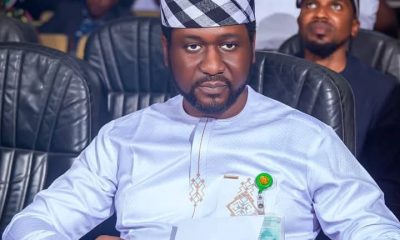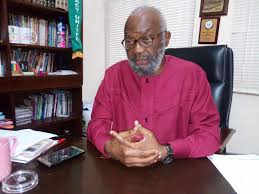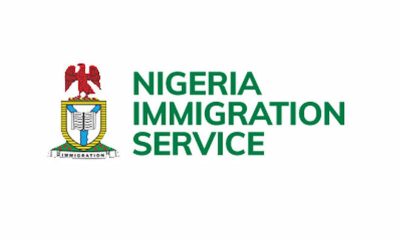Foreign News
Conflict in Sudan Taking Dangerous Turn for Civilians – UN

UN High Commissioner for Human Rights Volker Türk, has said that the conflict in Sudan is taking an “even more dangerous turn for civilians.”Türk gave the warning in a statement on Friday.His warning comes amid reports that dozens were brutally killed in ethnically targeted attacks in Al Jazirah state in the southeast.
This is also amid reports of an imminent battle for the control of the country’s capital, Khartoum. The Sudanese Armed Forces (SAF) and a rival military, the Rapid Support Forces (RSF), have been fighting since April 2023 in what Türk called a “senseless war”.As they “battle for control at all cost, direct and ethnically motivated attacks on civilians are becoming increasingly common,” he noted.“The situation for civilians in Sudan is already desperate, and there is evidence of the commission of war crimes and other atrocity crimes.“I fear the situation is now taking a further, even more dangerous turn,” he said.In the last week alone, his office, OHCHR, documented at least 21 deaths in just two attacks on camps in Al Jazirah, located some 40 kilometres from the state capital, Wad Madani.However, the actual number of attacks directed at civilians, and of civilians killed, are likely to be higher.On Jan. 10, at least eight civilians were killed in an attack on Taiba Camp, and at least 13 women and one man were abducted.Houses were burnt and livestock, crops and other property looted, while dozens of families were displaced.The next day, at least 13 civilians were killed, including two boys, in an assault on Khamsa Camp.The attacks came in the context of the recapture of Wad Madani by the SAF.Reports suggest they were carried out by the Sudan Shield Forces led by Abu Aqla Keikal, a former RSF commander, who defected to the other side last October.The attacks reportedly targeted the Kanabi, a historically marginalised group comprised mainly of Nuba and other African tribes.Türk noted that the Sudanese authorities’ assurance that the attacks would be fully investigated and those responsible brought to justice, and an investigation committee has been established.“Retaliatory attacks – of shocking brutality – on entire communities based on real or perceived ethnic identity are on the rise, as is hate speech and incitement to violence.“This must, urgently, be brought to an end,” he said.He said that OHCHR received three videos that document scenes of violence, including unlawful killings.They were reportedly filmed in Wad Madani, with men in SAF uniforms visibly present.In the videos, victims were dehumanised and denigrated as “Wassekh” (dirt), “Afan” (mould), “Beheema” (animal) and “Abnaa E-dheif” (bastards).Summary executions were hailed by perpetrators as “Nadhafa” (a cleaning operation).Serious concerns also persist for civilians in North Darfur.There, ethnically motivated attacks by the RSF and its allied Arab militias against African ethnic groups, particularly the Zaghawa and the Fur, continue to exact a horrific toll.Separately, some 120 civilians were reportedly killed and more than 150 injured in drone attacks in the city of Omdurman, on Jan. 13.They were allegedly launched by the SAF on a market in the Ombada Dar es Salam square, an RSF-controlled area.Türk reiterated his call for the fighting to end, and for the warring sides to uphold their obligations under international humanitarian law and international human rights law.He also warned the proliferation of militia recruitment and mobilization of fighters – largely along ethnic lines – risks unleashing a broader civil war and inter-communal violence.“The SAF and the RSF are responsible for the actions of groups and individuals fighting on their behalf,” he said.He urged them to take immediate measures to ensure the protection of all civilians.Such measures should include taking all feasible measures to avoid, or at the very least, minimise harm to civilians in the conduct of hostilities.He added that prompt, independent, impartial and transparent investigations into all reports of violations and abuses were crucial. (NAN)Foreign News
US Senators Exempt HIV/Aids Funding from Planned Spending Cuts

Republicans in the US Senate have said they will spare the US-backed HIV/Aids programme Pepfar from cuts, amid a larger effort to reduce government spending.
Senators said they would end a plan to cut $400m (£300m) from the President’s Emergency Plan for Aids Relief programme, leaving total proposed cuts at $9bn.
The proposition was made in a Senate amendment to a rescissions package – meaning a bill that allows lawmakers to cancel previous funding approved by Congress.
The planned cancellations also include funds for international aid and public broadcasting.If the Pepfar amendment is approved, the bill will go back to the House of Representatives for another vote ahead of a Friday deadline.
Multiple senators from both parties had expressed concern with cuts to Pepfar, which was launched under President George W Bush and has been credited with saving tens of millions of lives around the world.
The Republican-controlled Senate can only afford a few defectors, assuming all Democrats vote in opposition. John Thune, the Republican Senate majority leader, said there had been a “lot of interest” in keeping the Pepfar funding intact.
Senator Susan Collins, a Republican from Maine, told reporters after a White House lunch on Tuesday that she was “very pleased” that the cuts would be removed.
Prior to the amendment, Collins had been vocal against the bill. She has not said whether the changes are enough to secure her support.
Office of Management and Budget (OMB) Director Russell Vought told reporters that the White House was on board with the Senate amendment, meaning that in its current form President Donald Trump would be willing to sign it.
In his second presidency, Trump has turbo-charged an effort to reduce government spending. Most of the cuts in the rescission bill are aimed at clawing back money that was previously earmarked for the American government’s main humanitarian assistance body, USAID, which recently announced its formal closure under Trump.
Trump’s moves have led to drastic reductions in HIV/Aids clinics in South Africa and other countries, precipitating a shortage of life-saving medicine and care.
Other cuts in the rescission bill are aimed at the funding for public broadcasters NPR and PBS.
Foreign News
WHO Commends Senegal for Eliminating Trachoma

The World Health Organization (WHO) has validated Senegal’s elimination of trachoma as a public health problem, making it the ninth country in WHO’s African Region to have achieved the feat.
WHO Director-General Tedros Ghebreyesus, in a statement, lauded the country for freeing its population of the disease.
“This milestone is yet another sign of the remarkable progress being made against neglected tropical diseases globally, and offers hope to other countries still working to eliminate trachoma.
”Trachoma has been known in Senegal since the early 1900s and was confirmed as a major cause of blindness through surveys in the 1980s and 1990s.
Senegal joined the WHO Alliance for the Global Elimination of Trachoma in 1998, conducted its first national survey in 2000, and completed full disease mapping by 2017 with support from the Global Trachoma Mapping Project and Tropical Data.
Trachoma control was consistently integrated into national eye health programmes – first under the National Programme for Blindness Prevention (PNLC) and later through the National Programme for the Promotion of Eye Health (PNPSO).
The country’s consistent integration of trachoma control into its national eye health programmes positioned it to significantly maintain its commitment to the elimination of the disease.
“Today we celebrate our victory against trachoma, 21 years after the one against dracunculiasis”, Dr Ibrahima Sy, Senegal’s Minister of Health and Social Action, said.
“This new milestone reminds us that our overarching goal remains a Senegal free from neglected tropical diseases.
“We are fully committed to this, and we are making good progress, notably against human African trypanosomiasis (sleeping sickness) and onchocerciasis”.
Senegal implemented the WHO-recommended SAFE strategy to eliminate trachoma with the support of partners, reaching 2.8 million people who needed them across 24 districts.
These activities included the provision of surgery to treat the late blinding stage of the disease and conducting antibiotic mass drug administration of azithromycin donated by Pfizer through the International Trachoma Initiative.
Similarly, public awareness campaigns were carried out to promote facial cleanliness and improvement in access to water supply and sanitation.
Trachoma is the second neglected tropical disease to be eliminated in Senegal. In 2004, the country was certified free of dracunculiasis (Guinea-worm disease) transmission.
Senegal now joins 24 other countries that have been validated by WHO for eliminating trachoma.
The 24 countries are Benin, Burundi, Cambodia, China, Gambia, Islamic Republic of Iran, Lao People’s Democratic Republic, Ghana, India, Iraq, Malawi, and Mali.
The others are Mauritania, Mexico, Morocco, Myanmar, Nepal, Oman, Pakistan, Papua New Guinea, Saudi Arabia, Togo, Vanuatu, and Vietnam.
These countries are part of a wider group of 57 countries that have eliminated one or more neglected tropical diseases.
WHO is supporting Senegal’s health authorities to closely monitor communities in which trachoma was previously endemic, to ensure there is no resurgence of the disease.
“Trachoma has cast a shadow over communities in Senegal for more than a century.
“This long-awaited validation is not only a milestone for public health but a powerful tribute to the tireless dedication of frontline health workers, communities, government leaders, and partners who never gave up,” Dr. Jean-Marie Vianny Yameogo, WHO Representative in Senegal, said.
“Today, we close a chapter that began over a hundred years ago, united with pride, gratitude and resolve. WHO remains committed to supporting Senegal as the country continues to lead in sustaining this hard-earned achievement.”
Trachoma remains a public health problem in 32 countries, with an estimated 103 million people living in areas requiring interventions against the disease.
Trachoma is found mainly in the poorest and most rural areas of Africa, Central and South America, Asia, the Western Pacific and the Middle East.
WHO’s African Region is disproportionately affected by trachoma, with 93 million people living in at-risk areas in April 2024, representing 90% of the global trachoma burden.
Significant progress has been made in the fight against trachoma over the past few years, and the number of people requiring antibiotic treatment for trachoma in the African Region fell by 96 million from 189 million in 2014 to 93 million as of April 2024, representing a 51 percent reduction.
There are currently 20 countries in WHO’s African Region that are known to require intervention for trachoma elimination.
They are Algeria, Angola, Burkina Faso, Cameroon, Central Africa Republic, Chad, Côte d’Ivoire, Democratic Republic of the Congo, Eritrea, Ethiopia, and Guinea.
The others are Kenya, Mozambique, Niger, Nigeria, South Sudan, the United Republic of Tanzania, Uganda, Zambia, and Zimbabwe.
A further 3 countries in the Region (Botswana, Guinea-Bissau and Namibia) claim to have achieved the prevalence targets for elimination.
Foreign News
Israel Bombs Syrian Forces Entering Druze City after Sectarian Clashes

Torough David, Abuja
Israel says it has bombed Syrian government forces around Suweida, as they entered the predominantly Druze city following two days of deadly sectarian clashes.
About 100 people have reportedly been killed since the fighting between Druze militias and Bedouin tribes erupted on Sunday.
Syria’s defence minister announced a ceasefire in Suweida on Tuesday morning, saying an agreement had been reached with local dignitaries for security forces to deploy there.
However, one Druze spiritual leader urged local fighters to resist.Later, Israel’s prime minister said he had ordered strikes on forces and weapons in the Suweida area because the government “intended to use [them] against the Druze”.
Benjamin Netanyahu said he was committed to preventing harm to the Druze in Syria because of their deep ties to those living in Israel and the Israeli-occupied Golan Heights.
This is the first time that Syrian government forces have been deployed to Suweida since Islamist-led rebels overthrew President Bashar al-Assad in December.
Minority communities are suspicious of interim President Ahmed al-Sharaa’s government despite his pledges to protect them, and until now the province of Suweida had remained largely under the control of Druze militias which resisted calls to join the security forces.
The fighting between Bedouin tribes and Druze militias in Suweida was reportedly sparked by the robbery and abduction of a Druze merchant on the highway to Damascus last Friday.
On Sunday, armed Druze fighters reportedly encircled and later seized the city’s al-Maqwas neighbourhood, which is inhabited by Bedouin.
The clashes soon spread into other parts of Suweida province, with tribesmen reportedly launching attacks on Druze towns and villages on the city’s outskirts.
As the death toll reached 30, Syria’s interior ministry announced that its forces and those of the defence ministry would intervene and impose order, saying the “dangerous escalation comes in light of the absence of relevant official institutions”.
There was a brief period of calm on Sunday night, after mediation between Bedouin and Druze leaders resulted in the release of people kidnapped by both sides, according to activist-run news outlet Suwayda 24.
But on Monday, it said the fighting had resumed in the countryside west of the city after drones attacked villages at the same time as government forces deployed in nearby areas of eastern Deraa province.
Later, Suwayda 24 reported that villages in the area were also hit by mortar fire and that dozens of dead and wounded had been brought to local hospitals.
Meanwhile, the Israeli military said it had struck several government tanks to prevent them advancing towards Suweida city. Israeli Defence Minister Israel Katz said the strikes were a “clear warning to the Syrian regime”.
On Monday evening, the Syrian Observatory for Human Rights, a UK-based monitoring group, reported that 99 people had been killed, including 60 Druze, including four civilians, 18 Bedouin fighters, 14 security forces personnel.
The defence ministry said 18 security personnel had been killed during attacks on military points by what it called “outlaw groups”.
On Tuesday morning, the Druze spiritual leadership said they had agreed to allow government forces to enter Suweida province in order to end the bloodshed. They also called on all armed groups there to co-operate and hand over their weapons.
But hours later, influential Druze Sheikh Hikmat al-Hajri posted a video calling on Druze fighters to “resis[t] this brutal campaign by all available means”, accusing government forces of bombarding Suweida city in violation of a ceasefire agreement.
As security forces entered the city, Defence Minister Maj Gen Murhaf Abu Qasra announced a “complete ceasefire”, saying an agreement had been reached with “notables and dignitaries”.
“Suweida neighbourhoods will be under the control of Internal Security Forces as soon as combing operations are completed in order to control the chaos, secure return of residents to their houses,” he added.
Early on Tuesday afternoon, Israeli Prime Minister Benjamin Netanyahu and Defence Minister Israel Katz said they had directed the Israeli military to immediately attack Syrian forces and weaponry sent to the Suweida area “that the regime intended to use against the Druze”.
They accused the Syrian government of contravening “the demilitarisation policy they decided on” and of endangering Israel by deploying forces there.
“Israel is committed to preventing harm being inflicted on the Druze in Syria, owing to the deep covenant of blood with our Druze citizens in Israel and their historical and familial link to the Druze in Syria,” they added.
The Syrian Observatory shared a video that it said showed at least one member of the security forces who was killed in an Israeli strike on a convoy.
There was no immediate response from the Syrian government.
Earlier this year, Netanyahu warned that he would not “tolerate any threat” to Syria’s Druze and demanded the complete demilitarisation of Suweida and two other southern provinces,
He said Israel saw interim President Sharaa’s Sunni Islamist group, Hayat Tahrir al-Sham (HTS), as a threat. HTS is a former al-Qaeda affiliate that is still designated as a terrorist organisation by the UN and UK, but no longer the US.
The Israeli military has already carried out hundreds of strikes across Syria to destroy the country’s military assets since the fall of the Assad regime.
And it has sent troops into the UN-monitored demilitarised buffer zone between the occupied Golan Heights and Syria, as well as several adjoining areas and the summit of Mount Hermon.





















